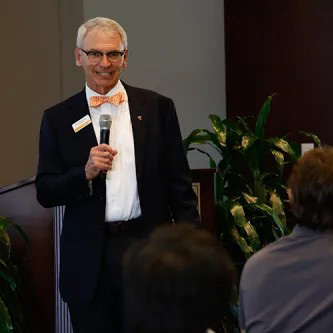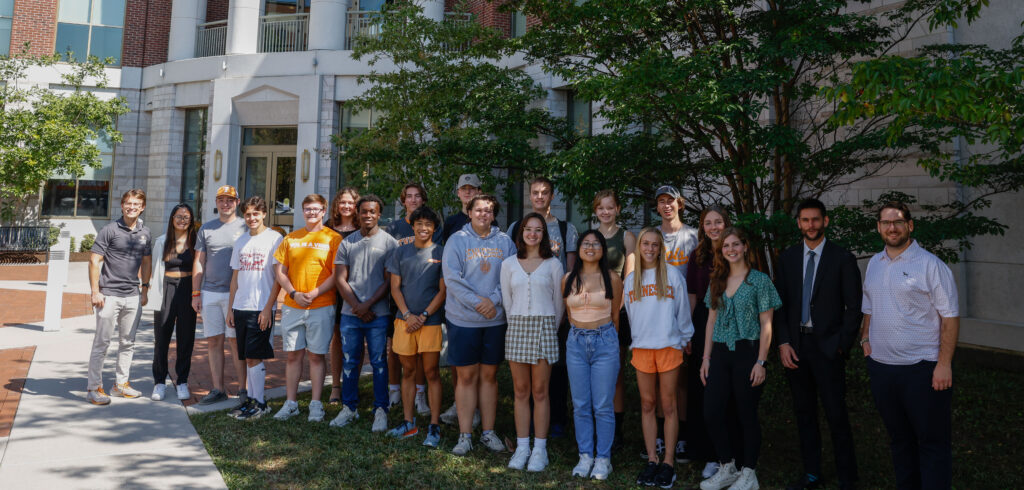Students Finish Inaugural TN Grand Challenges Fellowship

During the fall semester, the Institute of American Civics at the Baker School and University Honors partnered to introduce first-year honors students to three of Tennessee’s grand challenges through their inaugural Grand Challenges Fellowship program.
Students attended five sessions and two additional engaged learning opportunities. Three of the sessions were individually dedicated to one of the grand challenges: Advancing K-12 Education, Overcoming Addiction, and Strengthening Rural Communities. At the sessions, students heard from professionals and academics whose work and research are directly contributing to solutions.
Each session covered the interdisciplinary approaches being used to understand the specific challenge and the ways that our society’s problem solvers are currently working to face it. The two additional civic-engaged learning opportunities were a way for students to make a connection between the grand challenges, local government, and the university. These opportunities included city council meetings, county commission meetings, or school board meetings. They also had an option to attend selected Baker School events.

Program’s Impact on Students
Before the program kicked off, students were most familiar with the challenge of advancing K-12 education. Annika Amaral felt especially connected. “Since I went to public schools and my parents are public school teachers, I would say that I am very familiar with the problems that arise when attempting to cater to large groups of people who need very different things while [being] chronically underfunded.”
Dr. Rachel White, assistant professor in UT’s Department of Educational Leadership and Policy Studies, sat down with the Director of Schools for Bradley County, TN, Dr. Linda Cash, to discuss the challenges K-12 education is facing. Students were surprised at the extent of interaction between school directors and state legislators, showing them the importance of building those relationships. They understood the depth of complexities in the education system and, therefore, the need for collaborative, community-focused solutions to address the system’s issues.
Scotty Brown highlighted the importance of not only improving K-12 but also the role students will play as the problem solvers of tomorrow. “Our kids are our future, so we should be doing everything we can from an educational standpoint to foster growth and prepare them for the best outcomes possible.”
By the end of the program, students were making connections between the three challenges. “By improving K-12 education, we could give the new generations the tools they need to succeed, therefore strengthening our rural communities and hopefully preventing the circumstances that would drive an individual into addiction,” stated Amaral.
To address the challenge of overcoming addiction, students considered the public policy implications of viewing addiction as a treatable condition instead of criminalizing it. After the panel with Herbert Slatery, former TN Attorney General, and Jennifer Tourville, executive director of Substance Misuse and Addiction Resource for TN, students appreciated the work being made to address the drug and addiction crisis in the state. The panelists highlighted the role of government in regulating and leading the healthcare industry, and the ways that efforts to create effective addiction treatment options are being supported throughout the state.
The program did more than introduce the challenges to the students. In some cases, it showed them career possibilities. Eli Hicks joined this program because he was interested in forming a community with other students who were similarly dedicated to finding solutions to Tennessee’s biggest challenges.
“I feel like the area I most gained knowledge in was the advancing rural communities’ area. I learned a lot from that panel and would be interested in potentially doing work in that field,” stated Hicks. Brooxie Carlton, assistant commissioner of community and rural development for the TN Department of Economic and Community Development, spoke with Dr. Gabe Schwartzman, assistant professor at UT’s Department of Geography and Sustainability, on the current public problem-solving that is working to improve health and labor force participation in rural areas.
Brown highlighted the role today’s college students can play in addressing these challenges. “I think the most important thing we can do as students to assist in these challenges is to be civically engaged. None of us can solve addiction, create better schools, or fix our rural challenges on our own. But collectively, as a society, we can work together to solve these problems,” Brown stated.
At the end of each session, students submitted written reflections. Dr. Josh Fagan, lecturer in the College of Emerging and Collaborative Studies (CECS), used ChatGPT to turn the students’ reflections into a summary, identify emergent themes, and conduct a sentiment analysis. At the final meeting, students used the ChatGPT output to reflect on the experience and explore the potential (and limitations) of AI as a tool for learning. “We wanted to show off what CECS is doing with the new applied AI degree,” said Dr. Jonathan Ring, Baker School Director of Undergraduate Studies. “UTK is a leader in training students in emerging technologies. AI tools are an inevitable part of the future of work. Students should know how to use the tools effectively. They also need to think about how their education is not about producing content, it’s about thinking, participating, and doing their own work.”
“The program was a big success,” said Ring. “The conversations were somehow inspiring despite the magnitude of the challenges being discussed. Students got to see how impressive the faculty at UTK are and how much the university can contribute to the state. We heard from public servants who care deeply about Tennessee. I was so impressed by how thoughtful and hardworking they were. It was a far cry from the stereotypes of the ivory tower and the mindless bureaucrat. Students were inspired and empowered.”